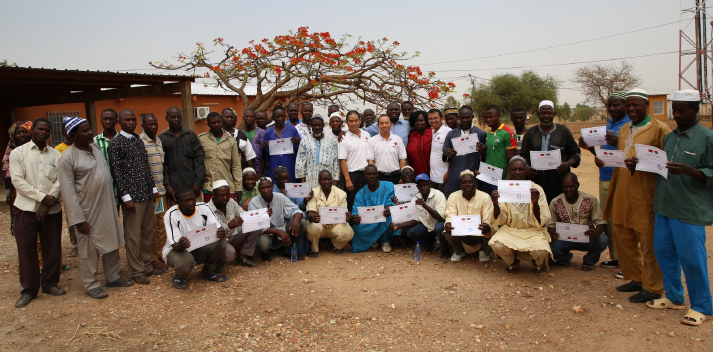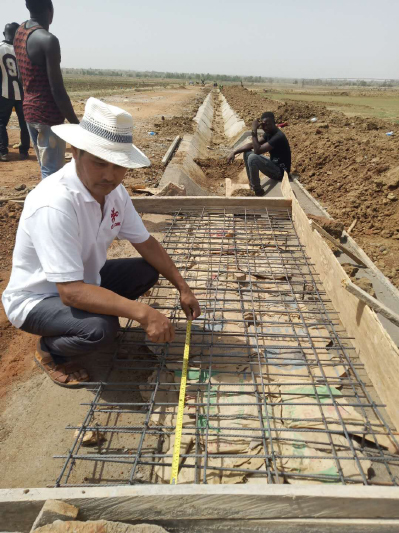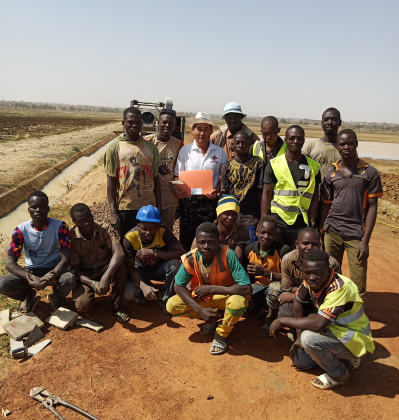|
||||||||||
| Home Nation World Business Opinion Lifestyle ChinAfrica Multimedia Columnists Documents Special Reports |
|
||||||||||
| Home Nation World Business Opinion Lifestyle ChinAfrica Multimedia Columnists Documents Special Reports |
| ChinAfrica |
| A Chinese agricultural expert in Burkina Faso shares new irrigation techniques to raise rice yields |
| As a result of their field research and discussion with local agricultural experts, the Chinese expert team identified a number of potential projects, including land reclamation and irrigation canal construction |
| By Li Jing VOL.12 September ·2020-09-14 |

In Bagré, an agricultural production area in central Burkina Faso, crystalline water flows along a new irrigation canal in the rice fields. The water comes from a reservoir located more than 10 km away. "This piece of land used to rely mainly on rainwater for its irrigation needs, but now it has a stable source of water to guarantee crops and rice yields," said Chen Zongquan, a member of the first mission of Chinese agricultural experts dispatched to Burkina Faso two years ago.
As an expert in water conservation and irrigation, 57-year-old Chen has a wealth of experience: He has been working, building and managing water conservation projects for 40 years. In Burkina Faso, he was in charge of supervising the construction project of a new irrigation canal, assisted by his team.
On May 26, 2018, after a freeze of 24 years, China and Burkina Faso announced the resumption of their diplomatic relations. At the request of the Burkinabe Government, nine Chinese agricultural experts, including Chen, were sent to Burkina Faso by the Chinese Ministry of Agriculture and Rural Affairs. Prior to the mission, Chen had worked in Africa in 2011, as an agricultural expert in Chad, where he carried out another agricultural cooperation project. In September 2018, he was able to go back to Africa to work in Burkina Faso, fulfilling one of his dearest wishes.
"I have a great deal of passion for the agricultural cause in Africa. I hope to share with our African partners my knowledge of water management in the field of agriculture and the experience I have gained from China, so as to enable them to explore their own agricultural development path specifically tailored to African countries," Chen told ChinAfrica. "Of course, working in Africa also means being away from my family, and I am grateful for their support."

Huge potential
Not long after arriving in Burkina Faso, Chen went through a large number of documents and traveled more than 4,000 km in 13 regions across the country to conduct his field survey. He spent quite some time in Bagré, Burkina Faso's largest rice-producing area, where he developed a set of water and irrigation projects adapted to local agricultural conditions. He also wrote a report on water conservation in Burkina Faso with the support of his colleagues.
According to Chen, the climate of Burkina Faso is characterized by low and irregular rainfall. The country's water resources are relatively limited due to its geographical position in West Africa and south of the Sahara desert. Therefore, farm irrigation requires a large and regular supply of water. But the lack of investment and insufficient number of specialized technicians have hampered the construction of badly needed water infrastructure. As a result, Burkina Faso produces only a quarter of the rice needed to feed its people. Every year, the country spends a colossal amount of money to import rice from abroad, which is placing a heavy burden on public finance. The construction of a better water conservation and irrigation system hence plays a key role in the sustainable development of local agriculture and in ensuring the country's food security.
"In fact, Burkina Faso has significant groundwater resources and the average annual rainfall in the capital is higher than in Beijing. Water scarcity is not a problem in and of itself. It is first and foremost a matter of educating the local population and showing them how to properly conserve and use water, which is exactly my field of expertise," Chen said.

Overcoming difficulties
As a result of their field research and discussion with local agricultural experts, the Chinese expert team identified a number of potential projects, including land reclamation and irrigation canal construction. Despite having made all necessary preparations, Chen and his team encountered many difficulties. Language barrier was the first of them. French is the official language of Burkina Faso, and Chinese experts had to be accompanied everywhere by French-speaking interpreters to facilitate communication. But things are more complex on the ground: Burkina Faso has more than 60 tribes and tribal languages, and many farmers do not understand French, making communication difficult during the construction phase. "In the absence of translators or when the local people did not speak French, it was impossible for me to show them directly how to use the proper irrigation techniques," Chen said.
In addition, Chen also conducted training on construction work safety and the proper use of project funds. "We apply strict budget rules to ensure that funds are not wasted and that the quality of work and materials is strictly enforced."
With the joint efforts of agricultural experts from China and Burkina Faso, a production base for rice seeds has been established on a four-hectare plot of land in Bagré. It is equipped with 415 meters of concrete irrigation channels, 513 meters of road and three bridges to allow mechanical tillage, as well as some other necessary support projects for the irrigation system. In addition, a drip irrigation project for two hectares of land was completed and a small dam was built to ensure water storage. "These water conservation projects can ensure stable rice seed production, reaching about 40 tons each year," he said.
"It is difficult to undertake this type of project here, because we have to ensure a constant supply of water and design our very own irrigation techniques. All of this is a major challenge for developing rice cultivation. But at least for now, water is no longer an obstacle," said Étienne Kaboré, person in charge at Bagrépôle, a government agency supporting Bagré's economic growth.
In June 2019, the Burkinabe Ministry of Agriculture and Hydro Agricultural Management awarded Chen a prize for his special contribution to the promotion of water conservation techniques in the country.
Passing on knowledge
In order to boost local capacity, Chen has conducted training and field demonstrations on water conservation techniques and methods. His training class focused on techniques to avoid wasting water used for irrigation, such as preventing infiltration and putting in place sprinkler irrigation and drip irrigation. So far, more than 200 people have taken part in these training sessions.
Chen also took the opportunity to share with the local population the experience he has gained in China while building water projects. "China is a country that also faces acute water shortages. Thanks to the efforts of several generations in China, the problem of food security has been gradually solved. I hope this will give courage to the Burkinabe people and stimulate them to continue on the path toward self-reliance."
The first agricultural cooperation project has been completed and successfully put into operation. For the moment, though, Chen is staying on in Burkina Faso to provide technical follow-up pending the start of his second mission.
"I will be part of the next project. I believe that, through the joint efforts of our two countries, Burkina Faso will eventually achieve self-sufficiency in rice production within the next eight to 10 years, and this will bring direct benefits to the local population."
(Printed Edition Title: A Source of Hope)
Comments to lijing@chinafrica.cn
| About Us | Contact Us | Advertise with Us | Subscribe |
| Copyright Beijing Review All rights reserved 京ICP备08005356号-5 京公网安备110102005860号 |